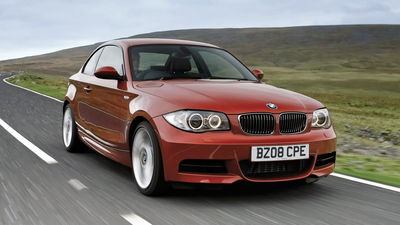Here’s Why We Can't Admit That The Worst Cars Are Sometimes The Best

Choosing a single car to cover all your bases is tough. It’s not always the most exciting metal that’s actually best for you. This week we’ve been reflecting on the multi-talented Skoda Karoq, and how, unexpectedly, it’s a car we’d buy with our own money even if that did mean swallowing a bit of anti-SUV pride. The same goes for any stereotypically dull but competent car.
This hits uncomfortably close to home. For the last 18 months I’ve been the custodian of a mind-numbingly dull – by normal CT standards – diesel Skoda Octavia estate, but the other day it struck me that I’ve never owned a car this long before, and that I’m set to own the thing for God knows how much longer yet. Oh.

This supposedly horrible eco-tube has been on my driveway since April 2019 and I’ve been determinedly trying to hate it ever since. It’s infuriatingly slow, sounds terrible, is annoyingly straight-laced inside and out, and basically just lacks any kind of charisma. And yet it’s just become the car I’ve owned longer than any other in my 15-year history of owning them. The only vehicle I’ve owned for longer was my Honda Hornet 600 motorbike, between 2003 and 2007, but for half of that I was away at university and barely rode it.
Knowing that my boredom wagon has been with me for longer than all the cars that I bought with a smile on my face makes me as uncomfortable as a uniformed traffic warden in a city centre pub. There was my Peugeot 206 GTi HDi, a small and very likeable semi-brisk hatchback that I should probably have kept for longer than 17 months.

There was the NA Mazda Eunos Roadster, for which I sold the 206. It was fantastic, but I only had it a year before a change of job saw me trade it in for something less chronically noisy on the motorway. It was a similar story for the Honda S2000 I was forced to sell during financially hard times, and the perky little Skoda Fabia vRS that I sold to help raise a mortgage deposit.
See also my beloved petrol-powered Octavia vRS (below), which I aimed to keep but couldn’t, in light of another new job and a mileage regime akin to something from a NASA journey planner. All of these cars that I genuinely wanted are now just memories and photos, and I’m left having done over 30,000 miles in a car that I keep telling myself I don’t want at all. Why do we lie to ourselves?

I clearly do want this car, otherwise I’d have chopped it in for something fruitier, or begged the buyer of my vRS to sell it back to me. I’m so determined to hate my pefectly functional family biffabout that I’d not allowed myself to admit that I still have it by choice, because, for better or worse, it’s the right car for me – and psychological science backs me up.
If you’ve not heard of Maslow’s hierarchy of needs, a quick Google will get you up to speed. It’s a layered triangular diagram describing the five tiers of human priorities, with the most important at the widest, bottom layer and the least important at the narrowest top point. The idea is that we need to have the lower layers in place before looking to the next.

Level one is your basic warmth, food and water, sleep and a couple of other can’t-live-withouts. Level two is safety and security. Financial security could easily slot into there, which is why a financially crippling project car frequently leaves you in cold sweats. Level three is friends and relationships, and it’s not until level four that you get to ‘esteem needs’ – and exciting cars fall smack-bang into this playground of non-essentials.
So, then. Choosing a car that will look after you financially is arguably two whole tiers more important than choosing a car that gives you the fizz. If you’re lucky enough to do relatively small mileage, you’ve got plenty of money or you live somewhere where fuel is cheap, you can easily overlook tier two as not applicable. The rest of us… well, it’s not so easy. We find it easier to hate on them rather than admit the unfashionable truth: that the best car for us is one people think is boring.

My Octavia has been as faithful as a family labrador. I’ve kept it serviced and it has never failed to get me to point B. It squeezes vast amounts of holiday luggage into its cavernous boot, is averaging 65mpg and has all the tech highlights I need. Cars like this are affordable and capable of ticking every box that matters most, but because they’re not the cars of our dreams we shrug them off like annoying cousins. Fast or not, exciting or not, fascinating or not: we should be nicer to them.














Comments
This reminds me of the first two cars I had, a 2003 Volvo XC70 wagon and a 2012 Vw Golf 90tsi hatch.
Both fall into the boring and ordinary category (at least as far a enthusiast vehicles are concerned). Neither was particularly fast, or are vehicles that draw interest.
Yet the XC70 won me over after years of use for being as dependable as the rising of the sun, being ridiculously comfortable (those seats were sooo good!), having surprisingly good fuel economy for it’s size, holding far more stuff then you would ever think possible, and going places that made people in lifted and chunky tyred 4x4’s drop their jaws in shock without ever getting bogged or bottoming out.
The golf was a car I did not like from the get go, as I had wanted a mk5 GTI but was forced to pick the similarly priced newer but duller and more ordinary mk6 90 tsi due to exorbitant insurance costs the GTI would have attracted. In near 7 years of ownership that golf proved to be a gem and is the source of many great memories. The factory sound system blew away a friend who is a huge audiophile, the time it got over 1000km out of 50 litres of petrol, the sweet gearshift and clutch, somehow fitting a half size marquee in the boot, and shaming many a more performance oriented car at the motorkhana course at Sydney Motorsport Park.
I came to care for that mk6 90tsi so much that I was devastated when during a torrential downpour a BMW X5 slid rear first down a hill and into it while I was stopped, with the damage being sufficient to result in it being written off. But even in it’s last moments it never let me down, despite the exhaust manifold being broken by the impact I walked away without a scratch. Then it soldiered on home, so I didnt have to find another way there in the pouring rain on a Saturday night. I still have a piece of that golf’s shattered grill, a reminder of it’s remarkable capability at everything I asked of it from start to finish.
Cars like this are affordable and capable of ticking every box that matters most, but because they’re not the cars of our dreams we shrug them off like annoying cousins. Fast or not, exciting or not, fascinating or not: we should be nicer to them.
I came to the exact same conclusion with my Kia Optima. The car isn’t a sexy sports car by any stretch of the imagination, but it’s easily the best car I’ve ever owned. Mundane cars that are supposed to do everything are usually the best designed of the bunch.
I have had people say that about my octavia estate, i have the vrs diesel. But when they want a comfy lift thats warm reliable and they know will get them there, they come to me. So secretly they love my car.